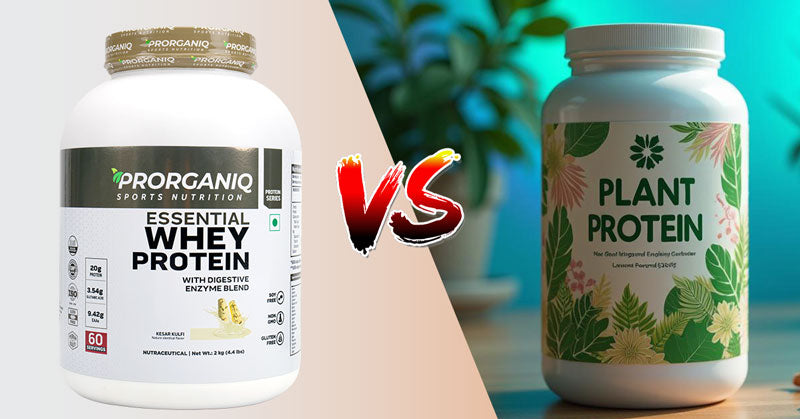Whey Vs. Plant Protein: Which Should You Buy?
Choosing the right protein supplement can be a pivotal decision for your fitness and health goals. Two of the most popular types of protein powders are whey and plant-based proteins.
Each has its own unique benefits and potential drawbacks, catering to different dietary preferences and health requirements.
| Quick Summary |
| Whey protein offers complete amino acids and faster absorption, ideal for muscle growth, while plant protein suits vegans and provides added fiber and nutrients. |
Whey Protein
Whey proteins tend to have a higher concentration of protein compared to plant-based proteins. An animal-based product, whey protein is significantly higher in terms of essential amino acids.
Known as a complete protein, whey protein is usually derived from cow's milk. It includes isoleucine, valine, and leucine that are branched-chain amino acids (BCAAs).
Whey protein includes all nine essential amino acids (isoleucine, leucine, lysine, threonine, tryptophan, histidine, methionine, phenylalanine, and valine). When it comes to muscle building, whey protein is a far more superior option than plant protein.
Whey protein is an excellent choice for fitness enthusiasts who want to gain solid muscle mass and strength. It can also be a good choice for athletes and bodybuilders who want to experience significant improvements in terms of performance, strength, force production, muscle thickness, and body composition.
Whey protein is also helpful for fitness enthusiasts who want to reduce body fat and recover quickly after intense workouts. It also helps in improving body composition.
Whey protein supplementation also improves hamstring flexibility and reactive strength. Ideally, you should buy whey protein that includes 25 to 30 grams of protein per serving.
Plant Protein
Plant proteins are vegan-friendly and lactose-free. This significantly reduces the risk of bloating, gas, and stomach upset. However, they are not complete proteins (with the exception of soy or certain mixes).
They are derived from different plants such as soy, and pea. Plant proteins generally include fewer BCAAs than whey proteins.
Plant protein is an excellent choice for individuals who are lactose intolerant or have digestive issues.
A good choice for vegans and vegetarians, plant protein can be sometimes bitter, nutty, and earthy. Plant protein is highly effective to reduce LDL (bad cholesterol), non-HDL cholesterol, and Apolipoprotein B-100 (ApoB).
It includes healthy fats, fiber, and other phytonutrients. Furthermore, plant protein has more fiber and antioxidants than most whey proteins. It also offers positive outcomes on metabolic health.
Both plant protein and whey protein can help you increase muscle mass, lose weight, improve body composition, and manage your weight.
They can be helpful to improve the production of energy in your body at a cellular level while offering support for protein synthesis.
Both whey protein and plant protein can help with muscle growth, repair, and recovery while giving you "energy bursts" to reap optimum advantages of resistance training.
While plant protein may be a better option for vegans and vegetarians, whey protein is the better option for building solid muscles.
Lastly, the right source of protein for you depends on your dietary intolerances, food habits, taste, lifestyle, and individual needs & goals.
Both plant protein and whey protein powders can make for an effective and nutritious addition to your exercise & diet plan. The final choice is all yours!
We hope that this guide on the pros and cons of plant protein versus whey protein would help you make the right decision.


